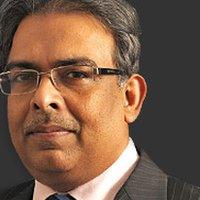Why protesting Indians are chanting the Constitution
- Published
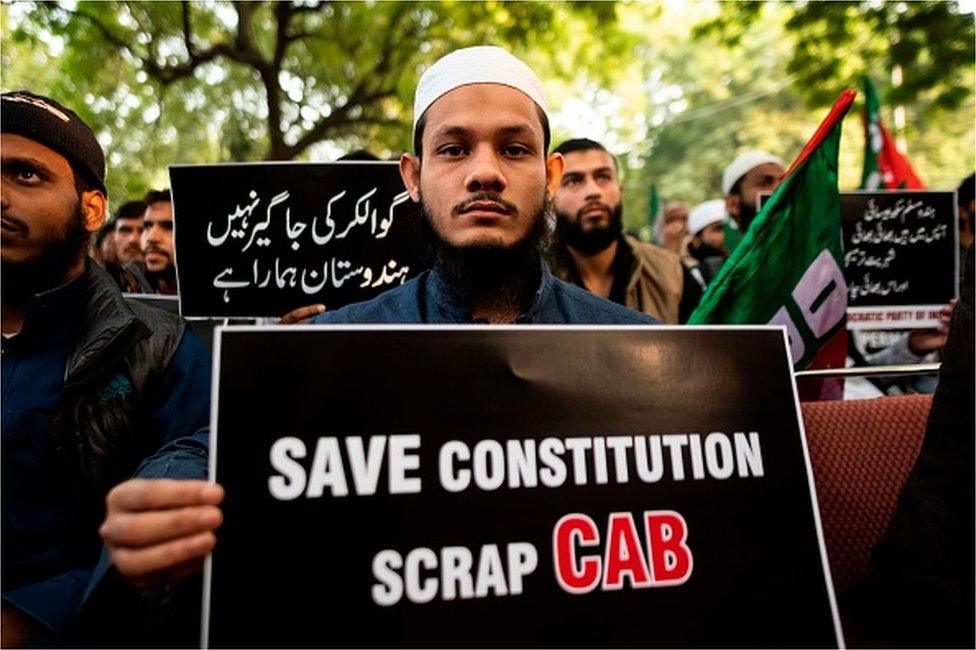
Protestors have been invoking the Constitution to protest against a new citizenship law
For more than a month now, men and women, young and old, have gathered in large numbers on streets and university campuses across India to protest against a new citizenship law which they believe is discriminatory.
There, they have been invoking the Constitution and chanting its solemn preamble, external, which promises justice, equality and fraternity and embodies the basic features of the nation's founding document.
The mass readings have revealed a deeper public engagement with the Constitution than commonly thought. So far most believed the Constitution hadn't travelled much in the public imagination beyond dreary classroom lessons.
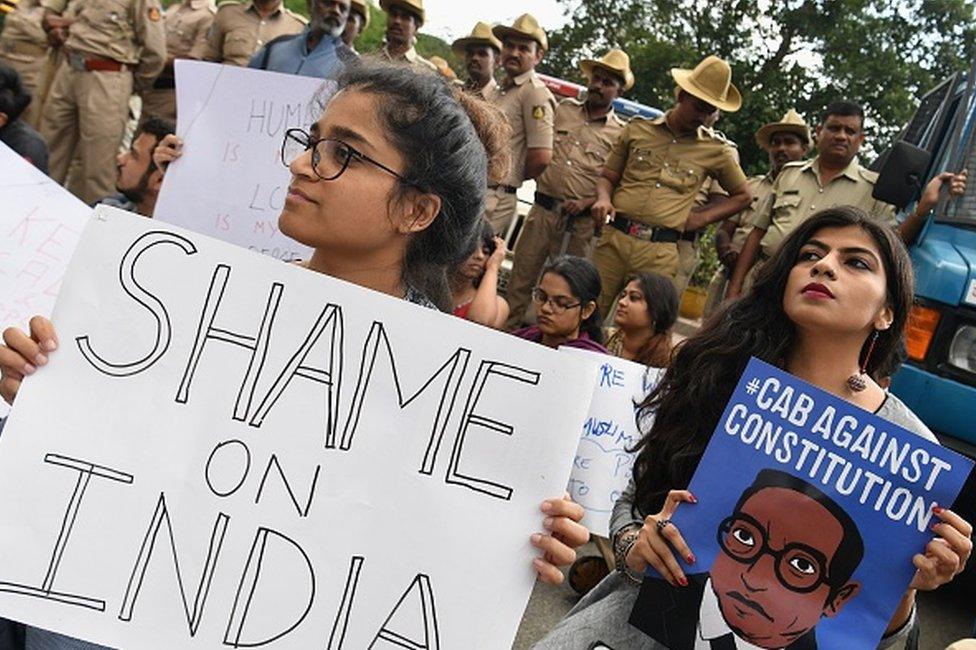
Protestors believe the new citizenship law discriminates against Muslims
India's Constitution, which took four years to write, is the world's longest founding document. The text governs more than a billion people who practise almost every mainstream religion.
The voluminous document contains more than 450 Articles and 12 Schedules and is painstakingly detailed. It is also, according to legal scholar Upendra Baxi, an "unparalleled exercise in verbosity", with the text scaling some "extraordinarily ludic heights". Article 367, for example, makes it clear that a foreign state "means a State other than India". The text has been amended more than 100 times since 1950.
Born in the aftermath of a bloody partition and independence, and written amid differences over the "religious and national vision" of what India should be, the Constitution is a remarkable document.
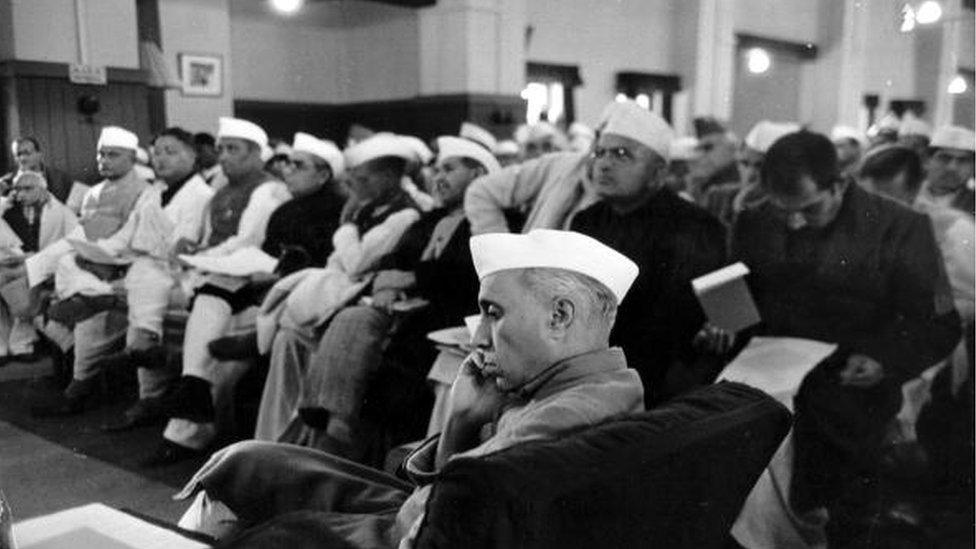
India's Constitution was framed by the Constituent Assembly
In trying to forge a national identity, the draft was debated fiercely and the document wrestled with questions relating to moulding a national identity in one of the world's most ethnically diverse countries. Critics say the Constitution was largely based on western ideas and written by western-educated elites. The preamble itself, according to scholars, was a compromise between a range of groups and interests and borrowed from colonial laws.
Seventy years later, the Constitution appears to be igniting the minds of ordinary Indians in a way not seen and heard of in the recent past.
But many scholars believe the document has always had a deep engagement with Indians. As Rohit De, an assistant professor of history at Yale University, explains in his extraordinary book, A People's Constitution, the document mattered to its citizens, and "constitutional engagement included large number of ordinary Indians, often from minorities or disprivileged groups".
Dr De writes about how thousands of ordinary Indians from all walks of life have invoked the Constitution in the courts ever since Mohammed Yasin, a young Muslim vegetable seller in north India, petitioned the Supreme Court in 1950, saying his rights to trade and an occupation, guaranteed by the document, had been violated by the authorities who had granted a single merchant a monopoly over the local vegetable trade.
But the ongoing engagement is much wider.
"There are two aspects that make the current engagement remarkable: first, its widespread extent, cutting across a range of demographics. In the 50s, particular groups argued that the Constitution protects them, but today diverse demographics make the case for the Constitution protecting everyone. The second, of course, is the profound focus on the preamble as opposed to specific rights," Dr De told me.
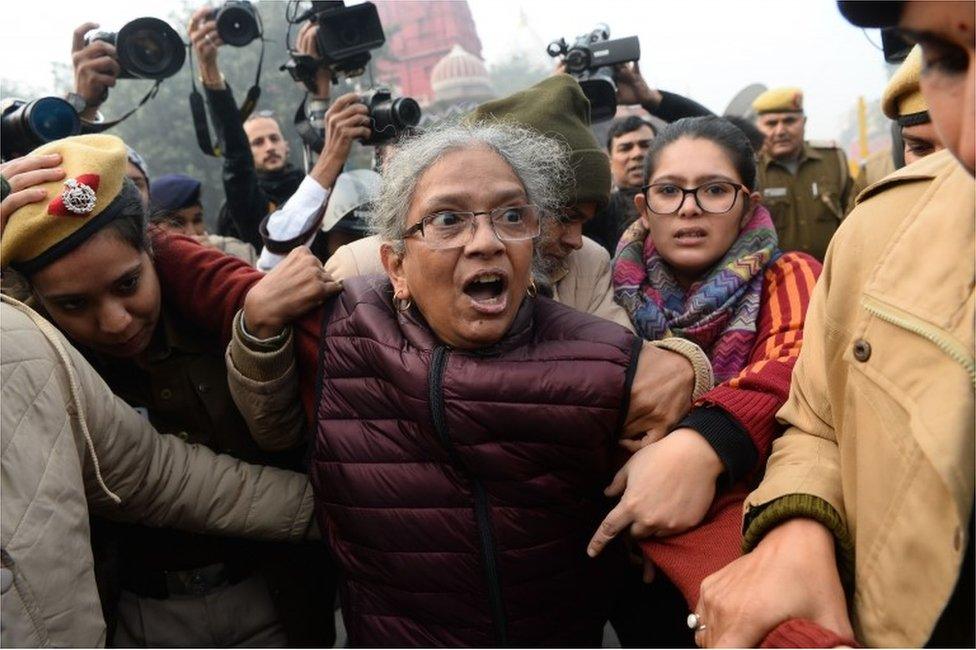
Hundreds of protestors have been detained all over India
The unprecedented reading of the preamble, he says, evokes the pro-Independence civil disobedience protests, when Indians marched, sang songs and recited a pledge of independence challenging British rule. "The protestors argued that power need not be given, but was taken by the people themselves," he says.
Many believe that citizens have taken to the Constitution partly because the Narendra Modi-led ruling Hindu nationalist BJP government has painted almost all opposition to its policies as "anti-national". "By using the constitution, the protestors can continue to assert their patriotism, use national symbols and songs and challenge the discourse of 'anti-nationalism' with constitutional patriotism," Dr De says.
Also, many believe, people are invoking the Constitution to express their displeasure with the "failure of the courts" - especially the Supreme Court - in not being transparent and its "weakening record" on civil liberties.
They say the top court, which has built a reputation for itself as a defender of constitutionalism against the executive, seems to have become muted when facing a government with a huge parliamentary majority like the BJP. "It is this absence of the court as the defender for civil liberty and constitutional processes, that is forcing ordinary citizens to step in and champion the Constitution." says Dr De.
Last month, 40 lawyers gathered in the lawns of the Supreme Court in Delhi and read out the preamble. And the Communist government in the southern state of Kerala announced that it would make the reading of the preamble compulsory during the morning assembly in schools.
"All this is very important and powerful. It aims to engage and articulate what India as a nation means," says Madhav Khosla, legal scholar and author of India's Founding Moment: The Constitution of a Most Surprising Democracy. "I don't think there is any precedence."

Read more from Soutik Biswas:

Follow Soutik on Twitter at @soutikBBC, external
